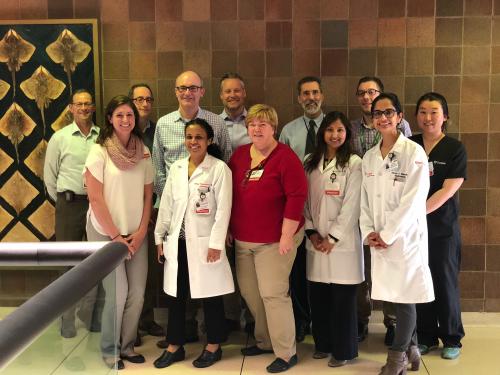
Core Experiences
Inpatient Consultative Service:
Fellows round on the inpatient nephrology consult service at one single location - Cooper University Hospital. This 600-bed tertiary care center provides immediate care for the urban population of Camden and also acts as a referral center for a wide geographic area covering South Jersey including the Jersey Shore. The hospital supports several ICUs (medical, cardiac, neuro, surgical) and is home to a world-renowned critical care department and level 1 trauma center. The nephrology service is purely consultative. Medical students from Cooper Medical School of Rowan University as well as Internal Medicine residents frequently rotate on service, and the nephrology fellow plays a key role in supervising their work. A robust team of Advanced Practice Providers help ensure that the learning environment nurtures a well-rounded educational experience for the trainee.
Outpatient Continuity Clinic:
Fellows take care of their own cohort of office patients at 3 Cooper Plaza, suite 215, located just across the street from the main hospital. Patient encounters are staffed by attending nephrologist preceptors, but the patients are primarily assigned to the fellows to follow up on labs and return patient calls. This clinic occurs one half day each week.
Transplantation Service:
We have a long-standing strong relationship with the Hospital of the University of Pennsylvania where our fellows will complete their transplant rotations. This world-renowned institution completes hundreds of transplants a year. Fellows will gain exposure to cutting edge developments in this field through rounding on the inpatient transplant service as well as participating in outpatient transplant clinics.
Outpatient In Center Hemodialysis:
Fellows will round with attendings at one of our several local outpatient hemodialysis units. Each fellow is assigned a specific shift of patients who they will follow longitudinally during the two-year program. Here they will gain exposure to dialysis access issues, anemia management, fluid volume management, mineral and bone disease management, goals of care discussions, and transitioning patients to transplant and home dialysis.
Home Dialysis Clinic:
Fellows will be trained to assess patients for home modalities, and to engage with patients in shared decision-making. Fellows will play an integral role in coordinating with our surgery team and outpatient dialysis staff to ensure a smooth transition from CKD to home dialysis. We have a robust Peritoneal Dialysis program, and fellows have the opportunity to take care of patients on a longitudinal basis to learn the nuances in management. Our fellows begin rotating through our peritoneal dialysis clinics during their first year and continue throughout the two-year training program.
During their second year of training, fellows will begin rounding at our Home Hemodialysis clinic. Here they will learn the similarities and differences in management of this population of patients as compared to in-center hemodialysis.
As a result, our fellows are well-equipped to handle the various complications associated with PD and home HD including access problems, treatment adequacy issues, infectious complications, and ultrafiltration failure among others, and graduate with confidence in managing home modalities for kidney replacement therapy.
Medical Director Rounds:
Through these special blocks, fellows will gain experience with the administrative and management aspects of leading a dialysis unit. Fellows will learn about decisions regarding patient admissions, human resources issues, and water treatment considerations at our outpatient dialysis clinics.
Glomerulonephritis Clinic:
Fellows will rotate with our experts in complex glomerular disorders. They will be exposed to immunosuppression management along with potential complications, review of kidney biopsies, and considerations for clinical trial referrals.
Onco-nephrology Clinic:
We are fortunate to have access to the resources of the MD Anderson Cancer Center at Cooper University hospital, and fellows will rotate through this unique clinic. They will gain experience identifying and treating the side effects of different therapies used for the treatment of malignancies, as well as taking care of CKD patients and helping to navigate unique goals of care discussions in the setting of malignancy.
Elective Opportunities:
Kidney Biopsies:
Fellows will have the opportunity to perform kidney biopsies under ultrasound or CT guidance. These are performed by a select group of our faculty and are performed in the main hospital.
Critical Care Rotations:
Fellows will have the opportunity to rotate with our internationally recognized critical care teams. They will gain a deeper understanding of hemodynamics, advanced therapies including ECMO and IABP, and have the opportunity to place non-tunneled dialysis catheters.
Medical Education Didactics:
Fellows with a particular interest in medical education, or who want to explore if this avenue is appropriate for them in their future careers, can participate in this didactic week to gain more education on a variety of topics from lecture creation, to providing feedback to learners, and how to manage anxiety while presenting.
